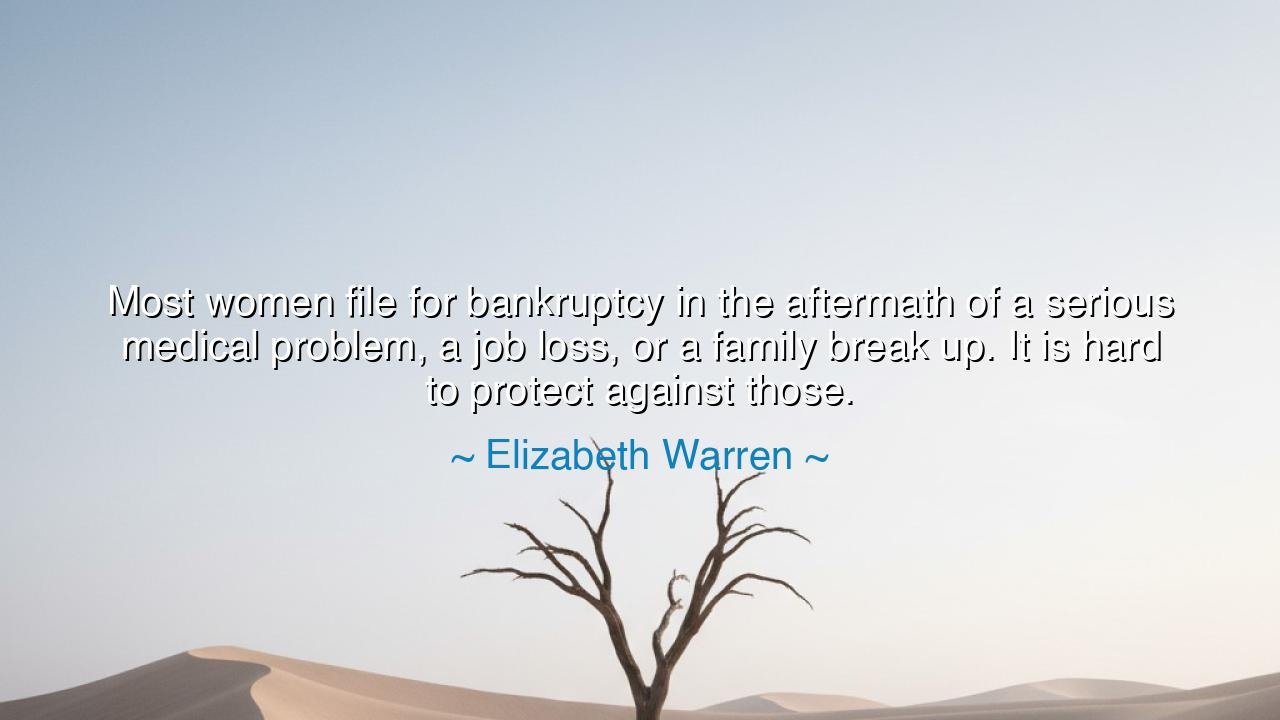
Most women file for bankruptcy in the aftermath of a serious
Most women file for bankruptcy in the aftermath of a serious medical problem, a job loss, or a family break up. It is hard to protect against those.






Hear, O children of justice, the words of Elizabeth Warren, who spoke with sorrow and fire: “Most women file for bankruptcy in the aftermath of a serious medical problem, a job loss, or a family break up. It is hard to protect against those.” In this saying lies the heavy truth of our age—that ruin often comes not from folly or waste, but from the storms of fate: sickness that drains both body and purse, labor lost when work vanishes, and the breaking of family bonds that once sustained. These are wounds against which even the strongest shield may falter.
The meaning of this utterance is deep and grievous. Warren reveals that financial collapse for many women does not spring from extravagance, but from catastrophe. A medical problem can strike without warning, carrying not only pain but a flood of bills that drown even the careful. A job loss can pull away the ground beneath one’s feet, leaving dignity shattered. A family break up—divorce, abandonment, separation—can turn stability into chaos. These trials are not rare misfortunes; they are common battles of ordinary lives, and thus the bankruptcy that follows is not a mark of weakness, but of how society leaves its vulnerable unprotected.
Consider, O hearers, the tale of the widows of the Great Depression. When the economic crash struck in 1929, many women were left to fend for themselves after their husbands lost jobs or abandoned families in despair. Without social safety nets, countless women fell into poverty, forced to beg, labor in the harshest conditions, or declare insolvency. Their ruin was not born of personal failure, but of a world unprepared to shield them from calamity. In their suffering, we hear the echo of Warren’s words: it is hard to protect against such blows without a society committed to justice.
The origin of Warren’s warning springs from her long study of bankruptcy law and the struggles of working families. She looked not at numbers alone, but at the stories behind them—women who carried children while burdened with debt, who labored with courage yet could not withstand the avalanche of bills when sickness or loss struck. Her words are a call to awaken hearts: bankruptcy is not merely an economic matter, but a human tragedy, one that reveals how fragile security can be, especially for women.
Let us not mistake her words as resignation. No—her declaration is not a sigh of despair, but a challenge. If it is hard to protect against those calamities, then it is the duty of a just society to build walls strong enough to shield its people. Medical care must not be a sentence to poverty. Work must be honored with stability and fair wages. Families must be supported so that when bonds break, lives are not destroyed. Warren’s wisdom points not to inevitability, but to responsibility.
The lesson for us is clear: do not scorn those who fall into bankruptcy, for often they are the victims of forces beyond their command. Instead, demand systems that defend the vulnerable. Remember that a society is measured not by how it treats its strongest, but how it cares for those struck by illness, loss, or heartbreak. For if we allow catastrophe to cast countless women into ruin, then the fabric of the whole community is torn.
Practical actions lie before us: support policies that provide affordable medical care, that safeguard workers against sudden job loss, and that grant dignity to families in crisis. In our personal lives, show compassion rather than judgment to those who struggle. Build communities of support—neighbors helping neighbors, families sustaining one another—so that no one faces catastrophe alone. And for those who walk in hardship, take courage: your fall is not your shame, but the mark of a society still learning to honor its duty.
Thus, O heirs of tomorrow, let Warren’s words be a guide. Do not forget that financial ruin is often the shadow of suffering, not of folly. Work to build a world where calamity does not equal despair, where sickness does not mean poverty, and where the breaking of one bond does not break the whole life. Protect the vulnerable, and you will protect the future.






AAdministratorAdministrator
Welcome, honored guests. Please leave a comment, we will respond soon